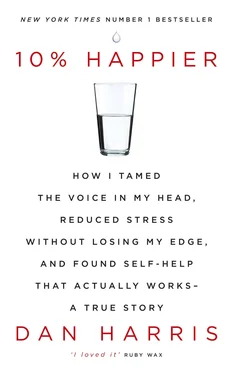Shortly thereafter, I admitted to Wonbo that he was right; we could start covering this beat with more nuance without having to move to public radio.
I became so gung ho about improving my faith coverage that, in the spring of 2005, I packed a Bible in my luggage as I headed off for a reporting trip to Israel, Egypt, and Iraq. I figured if I was going to be a proper religion reporter, I should at least read the source material.
It was right before I left on this trip to the Middle East that I had my last encounter with Peter Jennings. We met in his office, ostensibly so he could brief me on what my reporting priorities should be. He opened, characteristically, with an insult. “There’s a perception,” he said, “that you’re not very good at this sort of overseas coverage.” Even though I was reasonably sure this was untrue—and probably just part of Peter’s never-ending psyops campaign—I felt compelled to defend myself. As soon as I started to stammer out some sort of objection, though, he cut me off and lectured me about the various stories he wanted me to produce for his broadcast while I was abroad. Then he abruptly took a call from his wife, Kayce. After cooing into the phone for a few minutes, he hung up and looked at me and said, “I have a piece of advice for you, Harris: Marry well—at least once.”
A few weeks later, I was sitting out on the veranda of our Baghdad bureau, Bible in hand, struggling to get through Leviticus, with all of its interminable discussions of how to slaughter a goat. I stood up in frustration to go back into the office to check my computer, and that’s when I spotted the message from Peter. It was a group email announcing that he had lung cancer.
I never saw him again. By the time I got home, he had taken medical leave. Just a few months later, he was gone. Despite the fear and frustration he had provoked in me over the preceding five years, I felt enormous affection for him, and the night he died was one of the few times I could remember crying as an adult.
Perhaps more than any other single person outside of my immediate family, he had genuinely altered the course of my life. He built me into a better journalist than I had ever imagined I could be, sending me all over the world, giving me the chance to get a taste of the same gritty, global education that he, a high school dropout, had gotten during his years as a foreign correspondent. He could be a massive pain in the ass, but he was, in his own funny way, very generous. He was a restless soul, an idealist, and a perfectionist—a man who definitely followed my dad’s “price of security” maxim. No matter how hard he was on me, I always knew he was exponentially harder on himself.
Interestingly, during the entire time I knew Peter, the subject of his personal faith never came up. It wasn’t until years after his death that I learned that Peter himself was not particularly religious at all. He hadn’t needed faith in order to see that religion was a vital beat for us to cover; he was simply an insatiably curious reporter with a peerless instinct for what would interest the audience.
Peter’s death set off a ripple of reassignments among the on-air staff. The network’s first choice to replace him was the anchor duo of Elizabeth Vargas and Bob Woodruff, the correspondent I’d met in the presidential suite in the Islamabad Marriott. Only weeks after his ascent to the Big Chair, however, Bob was hit by a roadside bomb in Iraq and nearly died, which sent the news division reeling. Charlie Gibson from GMA was then tapped to move to the evenings, while Robin Roberts was elevated to be Diane Sawyer’s cohost.
Meanwhile, Ted Koppel had stepped down from Nightline and was replaced by the troika of Cynthia McFadden, Martin Bashir, and Terry Moran. I was then tapped to replace Terry on the Sunday edition of World News —a promotion I considered to be incalculably awesome.
In no way, however, did this step up the ladder reduce my neuroses about work. Quite the opposite, in fact. Yes, it was insanely great to be given the steering wheel of the news division every Sunday night—to pick the stories we’d cover, frame how they were presented, and then deliver it all right from the chair that Peter Jennings once occupied. Whenever anyone asked me, I told them I had the best job on the planet. And I meant it. But perversely, my good fortune meant I now had that much more to lose, and thus that much more to protect.
And the competition all around had intensified. I’d been at the network for five years, and the ranks of younger people had filled out dramatically. It wasn’t just David Wright I had to watch out for. There was also: Chris Cuomo, the charismatic, strapping son of the famous former governor of New York, who had replaced Robin Roberts on GMA ; Bill Weir, the hilariously funny and wildly creative former local sports anchor who’d been named as cohost of the newly created weekend edition of GMA ; and David Muir, the eminently likable, ferociously hardworking anchorman who had been lovingly profiled in Men’s Vogue and was now helming the Saturday edition of World News .
My relationships with these newer additions were great—they were friends—but that didn’t change the fact that we were locked in a zero-sum competition for a scarce resource: airtime. Specifically, assignments to cover the big stories, as well as fill-in slots for when the A-list anchors were away.
The mental loop ( How many stories have I had on this week? etc. ) that began when I first arrived from local news went into hyperdrive, only with an even more personal tinge. It was one thing, back in the day, to be big-footed by a veteran correspondent—but to be beat out by someone my own age, now that stung. Like almost all correspondents, every day I would check the “rundowns” for various shows—the computerized lists of stories the broadcasts would be covering—to see who was doing which ones. If someone scored an assignment I wanted, I’d experience a brief rush of resentment.
I’d collect data points ( Weir gets to cover the election of the new pope? Muir is filling in for Cuomo? ), and immediately extrapolate to far-reaching conclusions ( This means that x or y executive or anchor dislikes me → My career is doomed → I’m going to end up in a flophouse in Duluth ). Sometimes, before I’d even thought it through, I’d find myself on the phone with an executive producer of one of our broadcasts, saying impolitic things.
I would occasionally complain about all of this to Dr. Brotman, who applied his perfect shrink-y mix of sympathy and skepticism. He had a competitive job, too, negotiating the executive ranks at his hospital, but often he thought I was blatantly overreacting to intramural developments at ABC. In fact, his theory was that, just as I had used drugs to replace the thrill of combat, I was now inflating the drama of the office war zone to replace drugs.
Maybe. I was conflicted. I was absolutely aware that worrying could be counterproductive. Furthermore, I did not enjoy harboring competitive feelings toward people I liked and admired. But I still firmly believed that a certain amount of churning was unavoidable, especially in this business, and I had no intention of abandoning the whole “price of security” thing.
During this period, as I continued to deal with the aftermath of my panic attacks, my residual drug cravings, and the intensifying competitive pressures of work, it never once occurred to me that any aspect of the religious traditions I was reporting on could be relevant or useful to me personally. Faith was proving an increasingly interesting beat to cover for journalistic reasons, but it wasn’t serving the same purpose for me as it did for all the believers I was meeting: answering my deepest questions, or speaking to my most profound needs.
Читать дальше












